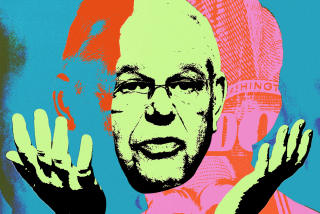Milken’s Trip to Tijuana Called a Bid to Boost Image
- Share via
In June 1989, indicted financier Michael Milken made an appearance in Tijuana to accept an honor from the Mexican & American Foundation and to give a luncheon speech that touted, among other things, bilingualism, education and an easing of the Third World’s debt burden.
The local visit struck some observers as out of character for the once-reclusive Milken, the Drexel Burnham Lambert junk bond king who would later be handed a 10-year prison sentence. But there he was, donning a hard hat and posing for the television cameras on a tour of Tijuana maquiladoras, attending a dinner at Agua Caliente racetrack with Mexican businessmen and calling for improved binational relations, with his teen-age son in tow.
Was Milken’s appearance in the cause of international understanding to be taken at face value or as part of campaign to improve his image and sway public opinion in light of his indictment the previous March on 98 counts of racketeering, fraud and making false statements?
A best-selling book on the insider trading scandal that eventually put Milken behind bars says the suspicions of the cynics were justified. James Stewart, author of hot-selling “Den of Thieves,” said the Tijuana visit and the honor received by Milken were consistent with an expensive but futile public relations campaign that he hoped would keep him out of jail.
Despite numerous other appearances designed by his PR team to create an image of Milken as a philanthropist and “national treasure” who was being unfairly victimized by an overzealous federal prosecution team, Milken pleaded guilty and was convicted on six felony counts. He agreed to pay $600 million in fines and began serving a 10-year sentence last March at a federal corrections facility in Pleasanton.
Stewart’s book, which for the last four weeks has topped the New York Times nonfiction best seller list, said the public relations campaign to “create an overall false portrait” of Milken backfired. Stewart, now the Wall Street Journal’s front page editor, won a Pulitzer Prize for his coverage of the 1987 stock market crash.
“It shows the hubris of the Milken camp that they tried to turn public opinion against the prosecution, against the government, and to turn Congress against the prosecution in order to get them to rein in the enforcement agencies,” Stewart said.
“They weren’t content to say Milken was an ordinary mortal but that he was super-hero on the capitalist stage,” Stewart said. “It’s a tribute to the American system of government that, even with the amount of money he spent, he couldn’t buy his way out of prison.”
Once Milken knew he was being targeted by federal investigators, he began paying a $150,000 monthly retainer to Robinson, Lake, Lerer & Montgomery, a New York public relations firm headed by Linda Robinson, the wife of American Express Chairman James D. Robinson. “That was just the contractual retainer. In actual billings, he paid them much more than that,” Stewart said.
The firm orchestrated a campaign involving favorable op-ed pieces supposedly written by Milken clients but in actuality provided by the PR firm. There were highly publicized visits such as Milken’s before the Mexican & American Foundation in Tijuana and a similar one before the National Organization of Successful Black Men Society in New York.
“The goal, Robinson and (chief partner Kenneth) Lerer told their staff, was to turn public opinion (of Milken) from outrage to neutrality to acceptance and finally to admiration, “ Stewart wrote in his book.
On his trip to Tijuana, Milken acted as a sort of tour guide for about 40 businessmen who visited the maquiladora district of Mesa de Otay, including the giant Sanyo facility. He gave interviews to the local press and appeared at a dinner at Agua Caliente racetrack with Mexican businessmen and women.
Tony Valencia, president of San Diego-based U.S. Mexico Foundation, the new name for the Mexican & American Foundation, said Milken made an unspecified donation to his group before being named speaker of honor, but that there was “no quid pro quo.” Valencia said he approached Milken about speaking before his group.
“He made a donation, as he has to hundreds of others, because he agreed with our three objectives--to assist small and minority businesses, to assist in trans-border commerce and to contribute to our college scholarship fund,” Valencia said.
Milken also took 1,700 underprivileged youths to a New York Mets baseball game, courted journalists with controlled personal interviews and got Milken junk bond customers to make testimonials on television and in newspaper op-ed pages. Stewart does not mention Milken’s Tijuana visit specifically, but his book includes a photo of Milken taken during his speech at the Tijuana luncheon.
Despite the firm’s efforts to “turn the battleship around in the water,” the image improvement campaign abruptly ended when Milken pleaded guilty in March, 1990, to six felony counts, “an amazing turnabout in the PR campaign because he had been so insistent all along in his total innocence.”
Milken’s case again goes before the U.S. District Court in New York this week in an effort to have his sentence reduced. Again, Stewart said, Milken has enlisted public relations in his legal efforts. Milken attorney Alan Dershowitz has appeared in full-page newspaper advertisements and on several national talk shows to condemn Stewart’s book as anti-Semitic, he said Monday.
“Imagine how Milken felt in the great contest in his life, losing and having to admit defeat and pleading guilty. He is still out there trying to reverse the verdict and win this battle,” Stewart said. “I think the PR campaign will be going on 10 years from now.
More to Read
Sign up for Essential California
The most important California stories and recommendations in your inbox every morning.
You may occasionally receive promotional content from the Los Angeles Times.










